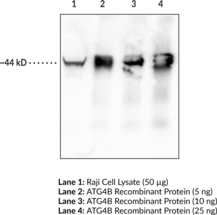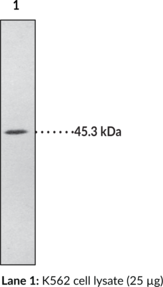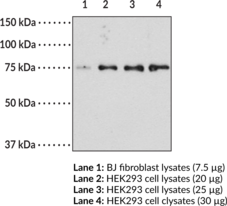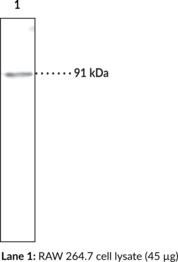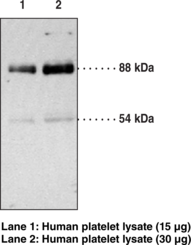Description
Autophagy-related 4B (ATG4B), also known as autophagin-1, is a cysteine protease and a member of the C54 protease family with dual roles in the progression of autophagy.{42341,42342} It catalyzes the irreversible proteolytic cleavage of human homologs of yeast ATG8 belonging to the microtubule-associated protein 1 A/B-light chain 3 (MAP1LC3/LC3) and the GABA receptor-associated protein (GABARAP) subfamilies, including LC3, GATE16, GABARAP, and ATG8L, to expose a C-terminal glycine residue that is essential to formation of the autophagosome. It also catalyzes the reversible deconjugation of phosphatidylethanolamine from C-terminal glycine lipid-conjugated Atg8 homologs.{42343} ATG4B expression is increased in CD34+ chronic myeloid leukemia (CML) stem and progenitor cells and knockdown of ATG4B expression increases accumulation of LC3-II and p62, indicating impaired autophagy, and reduces the viability and inhibits proliferation of CD34+ CML cells.{42344} Atg4-/- mice exhibit systemic decreases in basal and induced autophagy as well as increased susceptibility to colitis induced by dextran sodium sulfate (DSS) and pulmonary fibrosis induced by bleomycin (Item No. 13877).{42345,42346} Cayman’s ATG4B Monoclonal Antibody (Clone 8A5) can be used for Western blot and ELISA applications. The antibody recognizes ATG4B at approximately 44 kDa from human samples.
Synonyms: AUT-like 1 Cysteine Endopeptidase|Autophagin-1|Autophagy-related Protein 4 Homolog B|Cysteine Protease ATG4B|hAPG4B
Immunogen: Full-length human recombinant ATG4B protein
Formulation: 100 µg of protein G-purified monoclonal antibody
Isotype: IgG1
Applications: Elisa, IHC, IP, and WB
Origin:
Stability: 365 days
Application|ELISA||Application|Immunohistochemistry||Application|Immunoprecipitation||Application|Western Blot||Product Type|Antibodies|Monoclonal Antibodies||Research Area|Cancer|Autophagy||Research Area|Cell Biology|Endomembrane System & Vesicular Trafficking|Autophagy||Research Area|Cell Biology|Proteolysis|Cytosolic & Secreted Proteases||Research Area|Immunology & Inflammation|Gastric Disease|Ulcerative Colitis||Research Area|Immunology & Inflammation|Pulmonary Diseases
